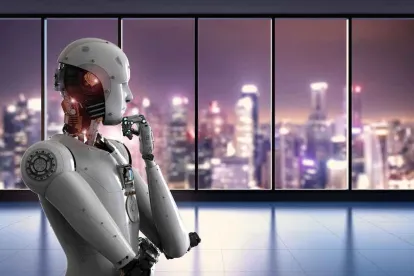The increasing sophistication of generative artificial intelligence (AI) has had widespread effects on fields ranging from art and film to law and healthcare. The implications for copyright law principles, such as authorship, infringement, and fair use, are significant, raising many complicated questions: Does the generative AI training or fine-tuning process infringe copyrights in other works? What is the proper scope of copyright protection for generative AI outputs? Who is liable for infringing works generated by AI? The copyright issues posed by generative AI are especially challenging because it is difficult to analogize generative AI models to precedent technology, policymakers have divergent definitions of what constitutes AI and many generative AI models are still evolving.
In this On the Subject, we discuss recent developments relating to generative AI and copyright law. Specifically, we provide an overview of:
-
The US Copyright Review Board’s recent rejection of copyright protection for artwork created using generative AI.
-
The US District Court for the District of Columbia’s decision in Thaler v. Perlmutter,[1] affirming that human authorship is required for copyright registration.
-
The recent US Copyright Office initiative and request for comments to explore various hot topics regarding generative AI and copyright law.
-
The Copyright Office’s March 2023 policy statement providing registration guidance on works containing AI-generated material.
IN DEPTH
REJECTION OF COPYRIGHT PROTECTION FOR AI GENERATIVE ART
The Copyright Office’s consistent position has been that AI-generated works are not entitled to copyright protection because they are not the product of human authorship. The Board applied this standard when it rejected copyright protection for an award-winning AI-generated artwork entitled “Théâtre d’Opéra Spatial.” Specifically, the Board held that the artwork contained “more than a de minimis amount of content generated by artificial intelligence,” which must be disclaimed to satisfy the human authorship requirement and qualify for copyright registration.
Artist James M. Allen utilized the generative AI system “Midjourney,” a text-to-picture AI service, to create a science fiction-themed artwork, which made headlines when it won the 2022 Colorado State Fair art competition. Allen filed an application for copyright registration but did not disclose Midjourney’s role. In response to the Copyright Office’s request for additional authorship information, Allen stated that he (1) first input “numerous revisions and text prompts at least 624 times to arrive at the initial version of the image,” (2) used Adobe Photoshop to remove flaws and create new visual content and (3) used Gigapixel AI to “upscale” the image by increasing its resolution and size. The Copyright Office refused to register the work because Allen declined the examiner’s request to disclaim portions of the artwork generated by AI.
Allen requested that the Copyright Office reconsider its initial refusal and register the entire artwork. The Copyright Office affirmed its rejection and concluded that although Allen’s human-authored edits made with Adobe Photoshop contained a sufficient amount of original authorship to be registered, the features generated by Midjourney and Gigapixel AI needed to be excluded/disclaimed as non-human authorship.
Allen appealed to the Board, arguing that the Copyright Office ignored his creative input into Midjourney, placed “a value judgment on the utility of various tools” and overlooked the applicability of the fair use doctrine coming from his transformation of the AI-generated raw material. The Board affirmed the Copyright Office’s stance, holding that if a work containing AI-generated material also contains sufficient human authorship to support a claim to copyright, then the Copyright Office will register the human’s contributions.
Applicants must disclose AI-generated content that is “more than de minimis” by including a brief description in the copyright registration application. The Board concluded that “Théâtre d’Opéra Spatial” contains an amount of AI-generated material that is more than de minimis and thus must be disclaimed because the Midjourney-generated image remains in substantial form in the final work and is not the product of human authorship. The same standard applies to Allen’s editing of the image via Gigapixel AI. According to the Board, inputting commands to a generative AI system does not amount to human authorship because the traditional elements of authorship are determined and executed by AI, not the human user.
The Board noted there may be future cases where the application of the de minimis standard is a closer call; however, the significance of Midjourney’s influence in the final work is clearly apparent here. The Board concluded that Allen’s remaining arguments were unpersuasive.
COPYRIGHT AUTHORSHIP OF AI-GENERATED WORKS
A recent opinion from the DC District Court held that a valid copyright requires human—not machine—authorship. However, this rule’s application is not black and white because it largely depends on the amount of human control/contribution over the AI-generated output.
The DC District’s decision in Thaler v. Perlmutter highlights the complexity of copyright authorship for AI-generated works. In 2018, Steven Thaler filed a copyright application to register an AI-generated visual art piece named “A Recent Entrance to Paradise.” The copyright application described the visual art as autonomously created by AI, identified the generative AI as the author and listed Thaler as the copyright claimant under the work-for-hire doctrine. The Board twice refused to register the work, finding that it lacked requisite human authorship because it was autonomously generated by AI. The Board also dismissed Thaler’s work-for-hire argument because AI cannot enter a binding legal contract. The DC District Court affirmed. The Copyright Act of 1976 provides immediate copyright protection to any work of authorship fixed in any tangible medium of expression. The DC District Court held that, although copyright law was designed to adapt to the times, there is an underlying and consistent understanding that human creativity is the driving force of copyrightability. AI is merely a tool used by humans.
THE COPYRIGHT OFFICE’S NOTICE OF INQUIRY AND REQUEST FOR COMMENTS
Authorship of AI-generated works underlies many of the critical issues raised in the Copyright Office’s August 2023 Notice of Inquiry and Request for Comments, which focuses on four categories of issues:
-
The use of copyrighted works to train AI models
-
The copyrightability of material generated using AI systems
-
Potential liability for infringing works generated using AI systems
-
Treatment of generative AI outputs that imitate the identity or style of human artists.
Regarding the first issue, the prevailing question is whether using copyrighted works to train generative and non-generative AI is an infringing use. Because copyright infringement requires an act of actual copying, this fact-specific inquiry heavily depends on the type of AI. Additional facts such as the collection and curation of AI datasets, training material sources and retention of records may also affect this analysis and subsequent opinions/policy.
Regarding the second issue, the uncertainty lies in where and how to draw the line between human creation and AI generation. The Copyright Office and US courts have repeatedly held that AI-generated work cannot be owned/authored by the AI itself because a valid copyright requires human authorship and creativity. However, the degree of human-authored contributions, or the level of control a human programmer has over the AI, may affect the copyrightability of the AI-generated work.
The third issue rises and falls with authorship: Who is liable for AI-generated work that is substantially similar or identical to another copyrighted work? How should liability be apportioned between the user who inputted the prompt, the system developers, the AI tool’s corporate owner, etc.?
Recent union strikes have highlighted the importance of the fourth issue: What protections, if any, do people have from AI copying their likeness? (Likeness includes image, voice and style.)
The Copyright Office posed 34 questions regarding copyright law and generative AI for public comment. Instructions for submitting comments are available on its website. Interested parties are encouraged to respond and need not answer all the questions. The public comment period closes on October 18, 2023. These conversations bring the United States closer to finding policy solutions for the problematic copyright questions surrounding generative AI.






 />i
/>i
